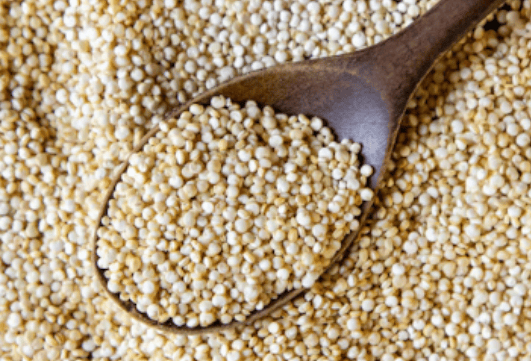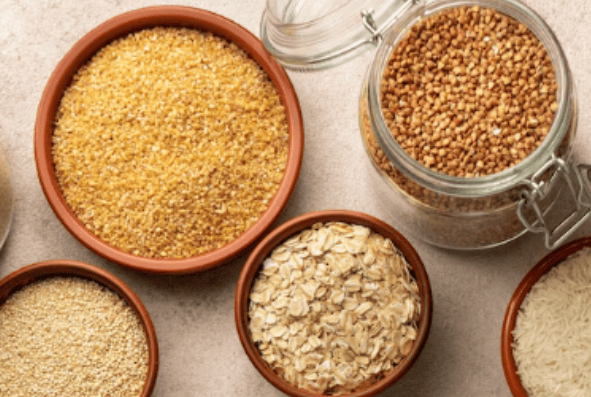We’re learning more every day about how important gut health is—not just for digestion, but for immunity, mood, and even inflammation. And while probiotics and fermented foods often get all the attention, whole grains are quietly doing some serious work behind the scenes.
Rich in fiber, prebiotics, and polyphenols, whole grains help nourish the good bacteria in your gut, keeping your digestive system balanced and your immune system strong. But not all grains are created equal. Some are more effective at supporting gut health than others, depending on their fiber type and nutrient density.
So, which grains actually support your gut—and how should you include them in your diet? In this article, we’ll break down the science behind whole grains for gut health and spotlight five gut-friendly grains that deserve a spot on your plate. If you’re ready to fuel your gut the smart way, let’s dig in.
Why Whole Grains Matter for Gut Health
Whole grains are more than just a healthier carb choice—they’re key players in building a better digestive system. One of the biggest reasons? They’re packed with dietary fiber, especially the insoluble kind that adds bulk to stool and the prebiotic fibers that nourish your gut’s good bacteria.
Unlike refined grains, whole grains retain their bran and germ layers, which are rich in nutrients and non-digestible fibers that serve as food for beneficial microbes. This process supports a more diverse and stable microbiome, which research increasingly links to reduced inflammation and better gut barrier function.
Studies show that fiber-rich grains for gut health, like oats and barley, help increase the production of short-chain fatty acids (SCFAs)—compounds that reduce gut inflammation and support colon health. SCFAs also strengthen the gut lining, helping prevent what’s often called “leaky gut.”
Plus, whole grains help improve regularity. Insoluble fiber adds bulk and speeds up transit time, making it easier to stay on schedule and avoid constipation.
The whole grain fiber benefits don’t stop at digestion either—they ripple out into immunity, metabolism, and mood regulation. In short, eating the right grains is one of the simplest and most natural ways to boost your gut health from the inside out.
5 Best Whole Grains for Gut Health
Not all grains are created equal—especially when it comes to supporting your gut. Some are packed with the right kind of fiber, prebiotics, and nutrients that feed your microbiome, reduce inflammation, and help your digestion stay on track. Here are five of the most effective gut healing grains to include in your diet.
1. Oats
How it supports gut health:
Oats are rich in a soluble fiber called beta-glucan, which is known to nourish beneficial gut bacteria. Beta-glucan forms a gel-like substance in the digestive tract, which slows digestion, supports the gut lining, and encourages the growth of short-chain fatty acid (SCFA)-producing microbes.
Key nutrients:
- Beta-glucan (soluble fiber)
- Iron, magnesium, and B vitamins
Ways to include in your diet:
Start your morning with oatmeal, add oats to smoothies or baked goods, or use them as a base for overnight oats. For the best results, opt for steel-cut or rolled oats rather than instant versions, which are more processed.
2. Barley
How it supports gut health:
Barley is another excellent source of beta-glucan and fermentable fiber, both of which fuel your gut bacteria. Studies have shown that barley consumption can reduce gut inflammation and increase microbial diversity—key indicators of a healthy microbiome.
Key nutrients:
- Soluble fiber (especially beta-glucan)
- Selenium, manganese, and phosphorus
Ways to include in your diet:
Try it as a base for grain bowls, in soups, or as a substitute for rice. Hulled barley is more nutrient-dense than pearled barley, although it takes longer to cook.
3. Quinoa

How it supports gut health:
Quinoa is a gluten-free pseudo-grain that’s gentle on the gut and ideal for people with sensitive digestion or gluten intolerance. Its fiber content, while lower than oats or barley, is still effective at supporting regularity and maintaining gut barrier health. Plus, it’s a complete protein, making it great for plant-based diets.
Key nutrients:
- Insoluble fiber
- All nine essential amino acids
- Magnesium, zinc, and folate
Ways to include in your diet:
Use quinoa in salads, stir-fries, or as a side dish. It cooks quickly and can also be added to soups or stuffed vegetables.
4. Brown Rice
How it supports gut health:
Brown rice contains resistant starch, a type of carbohydrate that ferments in the colon and produces beneficial SCFAs. These help feed your gut lining and balance the pH of your colon, reducing the risk of inflammation.
Key nutrients:
- Resistant starch
- Manganese, selenium, and B vitamins
Ways to include in your diet:
Replace white rice with brown rice in any dish, or cook and cool it to increase its resistant starch content. Try it in burrito bowls, grain salads, or alongside curries and stews.
5. Millet
How it supports gut health:
Millet is a naturally gluten-free grain that’s easy to digest and packed with prebiotic fibers, which help stimulate the growth of beneficial gut microbes. It’s also known for its anti-inflammatory properties and mild flavor.
Key nutrients:
- Prebiotic fiber (including arabinoxylans)
- Magnesium, copper, and phosphorus
Ways to include in your diet:
Cook millet like rice or quinoa, use it as a base for savory dishes, or turn it into a warm breakfast porridge. You can also bake it into muffins or use it in veggie burgers.
Adding a mix of these grains with prebiotics to your weekly meals can do wonders for your digestion, energy levels, and overall gut health. They not only feed your good bacteria but also help reduce inflammation and keep your gut lining strong—essential for long-term health.
How to Add Whole Grains to Your Diet
Incorporating healthy grains for gut microbiome support doesn’t have to be complicated. Start simple by swapping out refined grains—like white rice or white bread—with their whole grain counterparts. This small change can boost your fiber intake and help nourish your gut bacteria.
Try adding oats or barley to your breakfast routine. A warm bowl of oatmeal or barley porridge not only fills you up but also feeds your microbiome with valuable prebiotics.
For lunch or dinner, mix quinoa or brown rice into salads, grain bowls, or alongside your favorite proteins. These grains add texture, nutrients, and fiber, helping you feel satisfied longer.
To improve digestion and nutrient absorption, consider soaking whole grains before cooking. Soaking reduces compounds like phytic acid that can interfere with mineral absorption and makes grains easier on your gut.
Finally, pair whole grains with fiber-rich vegetables to maximize gut health benefits. This combo creates a diverse fiber profile that supports a thriving and balanced gut microbiome.
By making these small but consistent adjustments, you’ll help your gut flourish and enjoy more energy throughout the day.
Grains to Limit for Gut Health
Not all grains are created equal when it comes to supporting your gut. Refined grains—such as white bread, white rice, and many processed cereals—are low in fiber and essential nutrients. Because they lack fiber, they can cause rapid spikes in blood sugar, which may negatively impact gut bacteria balance over time.
These refined grains often undergo heavy processing that strips away the bran and germ, where most of the fiber and beneficial compounds reside. As a result, they provide “empty” calories with little gut-healing benefit. Regularly consuming refined grains may contribute to digestive issues like constipation and inflammation.
For optimal gut health, focus on minimally processed whole grains that retain their natural fiber and nutrients. These support a diverse and balanced gut microbiome, helping digestion and overall wellbeing. Limiting refined grains doesn’t mean you have to give up grains altogether—it simply means choosing smarter, gut-friendly options.
FAQs About Whole Grains and Gut Health
Can whole grains really improve gut health?
Yes! Whole grains are rich in dietary fiber and prebiotics, which feed beneficial gut bacteria. Research shows that regularly eating whole grains supports a diverse microbiome, improves digestion, and helps reduce gut inflammation.
Are all whole grains high in fiber?
Most whole grains contain good amounts of fiber, but the exact amount varies. For example, oats and barley are especially high in soluble fiber, while grains like quinoa offer moderate fiber with additional protein. Checking nutrition labels can help you choose high-fiber options.
Which grain is easiest to digest?
Quinoa and millet are often easier to digest, making them good choices for sensitive stomachs. They’re naturally gluten-free and have a gentler fiber profile compared to some heavier grains.
Can I eat grains if I have IBS?
Many people with IBS can tolerate whole grains, especially low-FODMAP options like oats and quinoa. However, it depends on individual tolerance—some may need to limit certain grains or prepare them in ways (like soaking) that improve digestion.
Are gluten-free grains better for the gut?
Gluten-free grains like quinoa, millet, and brown rice can be beneficial, especially for those with gluten sensitivity or celiac disease. However, whole grains with gluten, like barley and whole wheat, also support gut health in those who tolerate them well.
Conclusion: Embrace Whole Grains for a Healthier Gut
Whole grains rank among the best grains for gut health thanks to their rich fiber and prebiotic content. These nutrients are essential for feeding the beneficial bacteria in your digestive system, promoting microbial diversity and supporting smooth digestion. Adding grains like oats, barley, quinoa, brown rice, and rye to your diet regularly can help reduce inflammation, improve bowel regularity, and boost overall gut function.
The path to better digestion doesn’t require drastic changes—simple swaps like starting your day with oatmeal or adding quinoa to your salads can make a big impact. Embrace these whole grains for digestion to nurture your gut microbiome and support long-term health. Your gut—and your whole body—will thank you.
